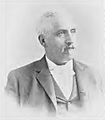George W. Dunn facts for kids
Colonel George W. Dunn (born November 27, 1840 – died November 27, 1914) was an important American politician from New York. He was known for his brave service in the American Civil War and his work in government and business.
Contents
Early Life and Military Service
George W. Dunn was born in Chenango, New York on November 27, 1840. His parents were John Dunn and Isabella Black. He went to Susquehanna Seminary and a business college. He was just about to start his career when the American Civil War began.
In May 1861, George joined the army. He became a sergeant in Company C of the 27th New York Volunteer Infantry Regiment. He was captured by the Confederacy during the First Battle of Bull Run. He was released in May 1862.
Later, in August, he joined the army again. This time, he was a captain in Company D of the 109th New York Volunteer Infantry Regiment. He was hurt in the Battle of Spotsylvania Court House in May 1864. After this battle, he was promoted to major.
During the Battle of the Crater, Colonel Dunn showed great leadership. When other leaders were injured, he took command of his Regiment. Because of his excellent service, he was promoted to colonel. From then on, everyone knew him as Colonel Dunn. He left the army honorably in May 1865.
After the War
After the war, Colonel Dunn started a business in Elmira. Within a year, he left to join a mining trip in Honduras. But the warm, tropical weather was not good for his health, so he returned home in late 1866.
In 1868, he was chosen to manage public documents for the Congress in Washington D.C.. He held this important job until 1875.
Public Service and Business Career
In 1875, Colonel Dunn moved to Binghamton. There, he was elected Sheriff of Broome County. After his term as sheriff ended, he helped combine two local newspapers. He became the treasurer and business manager for the new paper.
From 1881 to 1886, he served as Binghamton's postmaster. This meant he was in charge of the city's mail services. After that, he worked in real estate and manufacturing. He held many important roles in different companies and banks. For example, he was president of the Binghamton General Electric Company. He also helped manage the Binghamton State Hospital.
In 1889, he was again appointed postmaster of Binghamton. He also served as the Clerk of the New York State Assembly in 1894. Later, he was appointed to the New York State Board of Railroad Commissioners in 1897. In 1900, he became a trustee for the New York State Soldiers and Sailors' Home in Bath. This home helped soldiers and sailors.
Political Leadership
Colonel Dunn was very active in politics. He was a member of the New York Republican State Committee starting in 1886. In 1900, he was elected chairman of this committee. This was a very important position in the Republican party in New York. He held this role until 1904. He also attended the Republican National Conventions in 1904 and 1908. These are big meetings where the party chooses its presidential candidate.
Personal Life and Legacy
Colonel Dunn was a member of the Grand Army of the Republic, a group for Civil War veterans. In 1870, he married Sarah M. Thomas. They had one daughter named Mabel E.
Colonel George W. Dunn passed away at his home on November 27, 1914. It was his 74th birthday. He was buried in the family mausoleum in Floral Park Cemetery.
Images for kids


